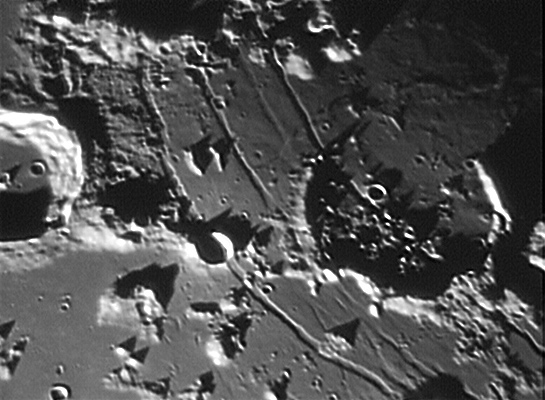Difference between revisions of "June 4, 2004"
| Line 1: | Line 1: | ||
__NOTOC__ | __NOTOC__ | ||
=Hippalus Arcs= | =Hippalus Arcs= | ||
| − | + | <table width="640" border="0" align="center" cellpadding="4" cellspacing="2"> | |
| − | + | <tr> | |
| − | + | </tr> | |
| − | + | </table> | |
| − | + | <table width="640" border="0" align="center" cellpadding="6" cellspacing="2"> | |
| − | + | <tr> | |
| − | + | <td> | |
| − | + | <div align="center">[[File:LPOD-2004-06-04.jpeg|LPOD-2004-06-04.jpeg]] | |
| − | + | </div></td> | |
| − | + | </tr> | |
| − | + | </table> | |
| − | + | <table class="story" border="0" bgcolor="#FFFFFF" width="90%" cellpadding="10" align="center"> | |
| − | + | <tr> | |
| − | + | <td><p class="Story" align="center"><b>Hippalus Arcs</b></p> | |
| − | + | <p class="story" align="left">Impact basins are characterized by a family of features such as multiple rims, concentric fractures and ridges, a central | |
| − | + | depression, radial markings, and extensive ejecta deposits. This list results not from a single perfect basin, but from | |
| − | + | recognizing consistent patterns in all the Moon's basins. The best place on the Moon to see basin-centered concentric | |
| − | + | rilles is near the crater Hippalus on the east side of Mare Humorum. In this remarkable image by Stephen Keene, Hippalus | |
| − | + | is the large (58 km wide) crater with a breached rim on the right side of the image, and part of Campanus is visible on | |
| − | + | the left (south up). Arcing through the middle of the image is a family of three prominent rilles whose radii of curvature | |
| − | + | point to a central focus somewhere in the middle of Mare Humorum, to the right. The low lighting reveals fragments of | |
| − | + | additional concentric and non-concentric rilles that show up better than on higher resolution Lunar Orbiter images. And | |
| − | + | in the center upper half of the picture is a small rimless pit that seems to be at the summit of a very low swelling. Is | |
| − | + | this a dome? A previously unknown one? </p> | |
| − | + | <p class="story" align="left"><B>Technical Details:</B><br> | |
| − | + | The image was taken afocal using a Sony Digital 8 camcorder and a Coulter 13 on a tracking platform. | |
| − | + | <p class="story" align="left"><i>Originally posted January 26, 2004 </i></p> | |
| − | + | <p class="story" align="left"><b>Related Links:</b><br> | |
| − | + | [http://www.lpi.usra.edu/research/lunar_orbiter/images/img/iv_132_h1.jpg Lunar Orbiter IV image]<br> | |
| − | + | [http://216.239.57.104/search?q=cache:rEw8wH_u9ikJ:www.lpi.usra.edu/meetings/LPSC99/pdf/1333.pdf+hippalus+rilles&hl=en&ie=UTF-8 Photogeologic Observations of Lunar Nearside Graben]</p> | |
| − | + | <p class="story"><b>Tomorrow's LPOD:</b> Copernicus</p> | |
| − | + | </tr> | |
| − | + | </table> | |
| − | + | <hr width="640" align="center"> | |
| − | + | <p align="center" class="main_titles"><b>Author & Editor:</b><br> | |
| − | + | [mailto:tychocrater@yahoo.com Charles A. Wood]</p> | |
| − | + | <p align="center" class="main_titles"><b>Technical Consultant:</b><br> | |
| − | + | [mailto:anthony@perseus.gr Anthony Ayiomamitis]</p> | |
| − | + | <p align="center" class="main_titles"><b>A service of:</b><br> | |
| − | + | [http://www.observingthesky.org/ ObservingTheSky.Org]</p> | |
| − | + | <p align="center" class="main_titles"><b>Visit these other PODs:</b> <br> | |
| − | + | [http://antwrp.gsfc.nasa.gov/apod/astropix.html Astronomy] | [http://www.msss.com/ Mars] | [http://epod.usra.edu/ Earth]</p> | |
| − | |||
| − | |||
| − | |||
| − | |||
| − | |||
| − | |||
| − | |||
| − | |||
| − | |||
<p> </p> | <p> </p> | ||
| − | |||
| − | |||
---- | ---- | ||
===COMMENTS?=== | ===COMMENTS?=== | ||
Click on this icon [[image:PostIcon.jpg]] at the upper right to post a comment. | Click on this icon [[image:PostIcon.jpg]] at the upper right to post a comment. | ||
Revision as of 18:21, 4 January 2015
Hippalus Arcs
Hippalus Arcs Impact basins are characterized by a family of features such as multiple rims, concentric fractures and ridges, a central depression, radial markings, and extensive ejecta deposits. This list results not from a single perfect basin, but from recognizing consistent patterns in all the Moon's basins. The best place on the Moon to see basin-centered concentric rilles is near the crater Hippalus on the east side of Mare Humorum. In this remarkable image by Stephen Keene, Hippalus is the large (58 km wide) crater with a breached rim on the right side of the image, and part of Campanus is visible on the left (south up). Arcing through the middle of the image is a family of three prominent rilles whose radii of curvature point to a central focus somewhere in the middle of Mare Humorum, to the right. The low lighting reveals fragments of additional concentric and non-concentric rilles that show up better than on higher resolution Lunar Orbiter images. And in the center upper half of the picture is a small rimless pit that seems to be at the summit of a very low swelling. Is this a dome? A previously unknown one? Technical Details: Originally posted January 26, 2004 Related Links: Tomorrow's LPOD: Copernicus |
Author & Editor:
Charles A. Wood
Technical Consultant:
Anthony Ayiomamitis
A service of:
ObservingTheSky.Org
Visit these other PODs:
Astronomy | Mars | Earth
COMMENTS?
Click on this icon File:PostIcon.jpg at the upper right to post a comment.




